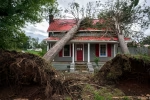
(Outlet: Bloomberg) More and more homeowners lack coverage they can’t afford or aren’t even aware they need.…Read More

(Outlet: Bloomberg) More and more homeowners lack coverage they can’t afford or aren’t even aware they need.…Read More

(Outlet: Ripple Effect) In this episode of Knowledge at Wharton’s Ripple Effect, Wharton’s Britta Glennon shares her research that dispels long-held myths about immigrants and how they influence the U.S. economy. This episode is part of a series on the “Business of Elections.”…Read More

(Outlet: Bloomberg) Ahead of a US election focused on migrants, Zeke Hernandez’s book argues that newcomers can make the whole country richer.…Read More

(Outlet: ABC News) The storm left devastation across a vast stretch from Florida to Tennessee.…Read More

(Outlet: Marketplace) Home buyers now have more tools to assess those risks. This month, Zillow, the country’s largest real estate search platform, announced it’s adding information about climate hazards, and how they might grow over time, to all of its property listings. Users will be able to scroll down to see a risk score for flooding, wind, wildfire, extreme heat and air quality, along with insurance recommendations to protect against related losses.…Read More

(Outlet: Bloomberg) The storm’s downpours have brought flooding far inland in the Southeast and Appalachia, where few homeowners are insured against it.…Read More

(Outlet: Grist) As premiums skyrocket, voters are starting to pay attention to one of the most obscure positions on the ballot.…Read More

(Outlet: WHYY) Immigrants drive job creation, start new businesses and bring innovative ideas that benefit everyone in the city, says Anuj Gupta, president and CEO of The Welcoming Center, and Zeke Hernandez, Max and Bernice Garchik Family Presidential Associate Professor at the Wharton School.…Read More

(Outlet: Energy Policy Now) Time-of-use electricity rates can save consumers money and optimize renewable power. But they can backfire if not carefully designed. Arthur van Benthem joins the Energy Policy Now podcast.…Read More

(Outlet: The Guardian) Experts are issuing stern warnings about business support for Trump – it could backfire badly and endanger democracy.…Read More